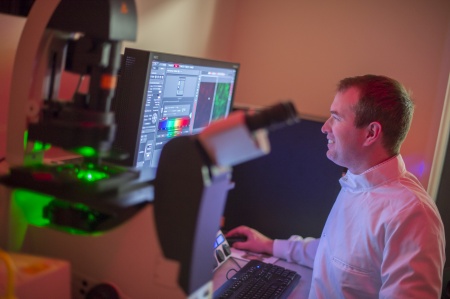
September 25, 2019, by Aleisha Turner
Digital Data in Cancer Research
Effective collaboration and data management using OneNote
Associate Professor Alan McIntyre (School of Medicine) leads a research group that studies the effects of hypoxia (low levels of oxygen) in the context of molecular and cell biology, with a focus on cancerous tumours. The research generates large amounts of raw and processed data in multiple formats. Both supervisors and collaborators need regular access to the data.
The challenge was to design a way of capturing and sharing data that both saves time and safeguards against loss, damage, and experiment irreproducibility.
Digital copies of all lab notebooks are now uploaded to OneNote and shared between members of the group. Sections can be added to the notebooks for organising meetings, keeping track of spending, and managing grants. Raw and processed data files are linked through OneDrive, where researchers store data individually in folders shared with the supervisor.
) Supervisors can now access lab notebooks remotely. This saves time previously spent meeting in person and going through paper notebooks.
‘The way we use OneNote to keep a digital lab book is very useful because we always have a backup of all work, which is important when you start to use multiple lab books and you don’t have to carry your old books around with you.’
2) Being able to combine multiple types of data into one format makes it much easier to share those data as well as manage different aspects of the project (data storage, protocols, meetings, expenditure) in a single and easily accessible place.
‘OneNote [is the] the bridge between our lab books and data files, and keeps everything in one easy-to-access place.’
3) Having digital copies of experiment protocols makes reproducing experiments easy. There is no longer a reliance on single-copy paper documentation. Moreover, if a researcher leaves the group or is away for an extended period, other members have access to the records and data, which is safely backed up in cloud-based storage.
‘It is much quicker and easier to flick to a certain date [when] work was performed.’
No comments yet, fill out a comment to be the first

Leave a Reply